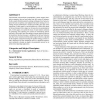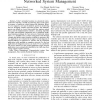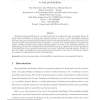1791 search results - page 153 / 359 » Two Types of Multiple-Conclusion Systems |
ACMICEC
2008
ACM
13 years 11 months ago
2008
ACM
Conventional conversational recommender systems support interaction strategies that are hard-coded into the system in advance. In this context, Reinforcement Learning techniques h...
NOMS
2010
IEEE
13 years 7 months ago
2010
IEEE
Abstract— Today’s networked systems are extensively instrumented for collecting a wealth of monitoring data. In this paper, we propose a framework called System-wide Similarity...
JAIR
2008
13 years 9 months ago
2008
Reasoning about agent preferences on a set of alternatives, and the aggregation of such preferences into some social ranking is a fundamental issue in reasoning about multi-agent ...
QUESTA
2007
13 years 8 months ago
2007
Obtaining (tail) probabilities from a transform function is an important topic in queueing theory. To obtain these probabilities in discrete-time queueing systems, we have to inve...
INFOCOM
2010
IEEE
13 years 7 months ago
2010
IEEE
Many modern systems exploit data redundancy to improve efficiency. These systems split data into chunks, generate identifiers for each of them, and compare the identifiers among ot...



